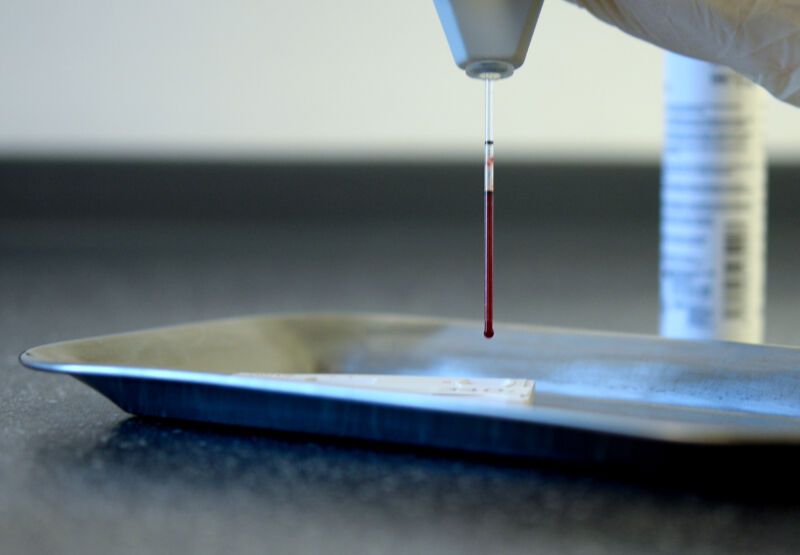
Trendy, unproven “vampire facials” performed at an unlicensed spa in New Mexico left at least three women with HIV infections. This marks the first time that cosmetic procedures have been associated with an HIV outbreak, according to a detailed report of the outbreak investigation published today.
Ars reported on the cluster last year when state health officials announced they were still identifying cases linked to the spa despite it being shut down in September 2018. But today’s investigation report offers more insight into the unprecedented outbreak, which linked five people with HIV infections to the spa and spurred investigators to contact and test nearly 200 other spa clients. The report appears in the Centers for Disease Control and Prevention’s Morbidity and Mortality Weekly Report.
The investigation began when a woman between the ages of 40 and 50 turned up positive on a rapid HIV test taken while she was traveling abroad in the summer of 2018. She had a stage 1 acute infection. It was a result that was as dumbfounding as it was likely distressing. The woman had no clear risk factors for acquiring the infection: no injection drug use, no blood transfusions, and her current and only recent sexual partner tested negative. But, she did report getting a vampire facial in the spring of 2018 at a spa in Albuquerque called VIP Spa.
“Vampire facial” is the common name for a platelet-rich plasma microneedling procedure. In this treatment, a patient’s blood is drawn, spun down to separate out plasma from blood cells, and the platelet-rich plasma is then injected into the face with microneedles. It’s claimed—with little evidence—that it can rejuvenate and improve the look of skin, and got notable promotions from celebrities, including Gwyneth Paltrow and Kim Kardashian.
The woman’s case led investigators to VIP Spa, which was unlicensed, had no appointment scheduling system, and did not store client contact information. In an inspection in the fall of 2018, health investigators found shocking conditions: unwrapped syringes in drawers and counters, unlabeled tubes of blood sitting out on a kitchen counter, more unlabeled blood and medical injectables alongside food in a kitchen fridge, and disposable equipment—electric desiccator tips—that were reused. The facility also did not have an autoclave—a pressurized oven—for sterilizing equipment.
A novel and challenging investigation
The spa was quickly shut down, and the owner Maria de Lourdes Ramos De Ruiz, 62, was charged with practicing medicine without a license. In 2022, she pleaded guilty to five counts and is serving a three-and-a-half-year prison sentence.
A second spa client, another woman between the ages of 40 and 50, tested positive for HIV in a screen in the fall of 2018 and received a diagnosis in early 2019. She has received a vampire facial in the summer of 2018. Her HIV infection was also at stage 1. Investigators scrambled to track down dozens of other clients, who mostly spoke Spanish as their first language. The next two identified cases weren’t diagnosed until the fall of 2021.
The two cases diagnosed in 2021 were sexual partners: a woman who received three vampire facials in the spring and summer of 2018 from the spa and her male partner. Both had a stage 3 HIV infection, which is when the infection has developed into Acquired Immunodeficiency Syndrome (AIDS). The severity of the infections suggested the two had been infected prior to the woman’s 2018 spa treatments. Health officials uncovered that the woman had tested positive in an HIV screen in 2016, though she did not report being notified of the result.
The health officials reopened their outbreak investigation in 2023 and found a fifth case that was diagnosed in the spring of 2023, which was also in a woman aged 40 to 50 who had received a vampire facial in the summer of 2018. She had a stage 3 infection and was hospitalized with an AIDS-defining illness.
Viral genetic sequencing from the five cases shows that the infections are all closely related. But, given the extent of the unsanitary and contaminated conditions at the facility, investigators were unable to determine precisely how the infections spread in the spa. In all, 198 spa clients were tested for HIV between 2018 and 2023, the investigators report.
“Incomplete spa client records posed a substantial challenge during this investigation, necessitating a large-scale outreach approach to identify potential cases,” the authors acknowledge. However, the investigation’s finding “underscores the importance of determining possible novel sources of HIV transmission among persons with no known HIV risk factors.”
